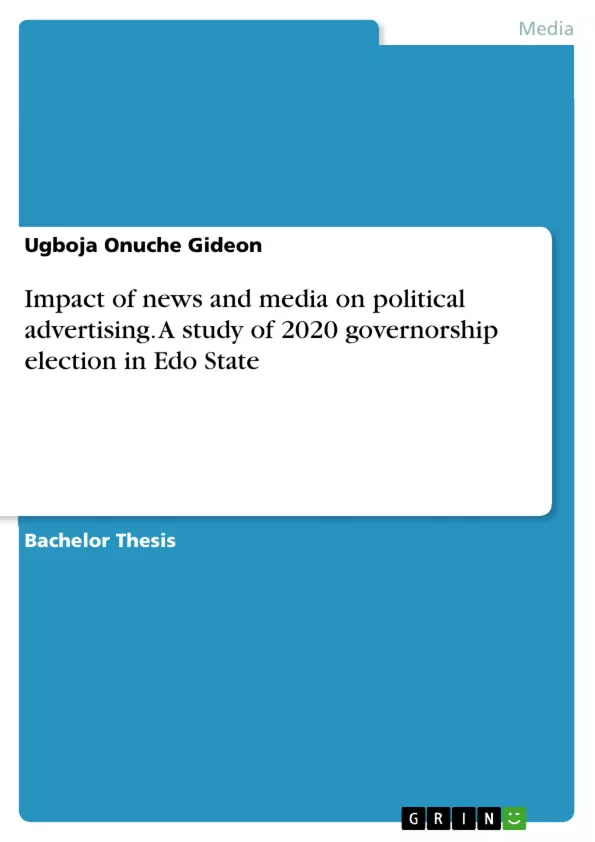This study examines impact of news media in political advertising in Edo state governorship election. The study was anchored on the uses and gratifications theory. The survey research method was used. The work recommends urgent review of the various media laws to address the peculiar technicalities involved in monitoring and moderating the use of different social media platforms. Findings show that whereas many used the technology to make vital input in the political discourse, others used them to attack opponents, spread false rumours, hate and inciting messages which were believed to have contributed in the violence and tensions witnessed before, during and after the elections in many parts of the country.
The following research questions have been drawn to guide the study: What is the impact of news media in political advertising in Edo state governorship election? Do political parties in Nigeria recognise and make use of the new media in their political campaigns? What are the factors that hinder the use of the new media for political campaigns in Edo State?
The new media have become veritable tools for political campaigns, because they break boundaries and frontiers, reaching every part of the world. The new media have consequences upon the social, political and economic values of people. New media hold out a possibility of on-demand access to content anytime, anywhere, on any digital device, as well as, interactive user feedback, creative participation and community formation around the media content. What distinguishes new media from traditional media is not the digitising of media content into bits, but the dynamic life of the new media content and its interactive relationship with the media consumer. This dynamic life, moves, breathes and flows with pulsing excitement in real time. It is against this backdrop therefore, that we investigate the impact of news media in political advertising: a study of 2020 governorship election in Edo state.
Inhaltsverzeichnis (Table of Contents)
- CHAPTER ONE: INTRODUCTION
- Background to the Study
- Statement of the problem
- Objectives of the study
- Research questions
- Research Hypothesis
- Significance of the Study
- Scope and Limitations of the Study
- Operational Definition of Terms
- CHAPTER TWO: LITERATURE REVIEW
- Introduction
- Concept of News Media
- Concept of Political Advertising
- Theoretical Framework
- Empirical Review
- CHAPTER THREE: RESEARCH METHODOLOGY
- Research Design/Technique
- Research Population
- Sampling and Sampling Technique
- Sample size
- Methods of data collection
- Method of data analysis
- Validity of Research Instrument
- Reliability of Research Instrument
- CHAPTER FOUR: DATA PRESENTATION AND ANALYSIS
- CHAPTER FIVE: SUMMARY, CONCLUSION AND RECOMMENDATION
- SUMMARY
- CONCLUSION
- RECOMMENDATIONS
Zielsetzung und Themenschwerpunkte (Objectives and Key Themes)
This study aims to examine the impact of news media in political advertising, focusing specifically on the 2020 Edo State governorship election in Nigeria. The research seeks to understand the role of new media in political campaigns and determine whether political parties recognize and utilize these platforms effectively.
- Impact of news media on political advertising in the Edo State governorship election.
- The role and use of new media by political parties in Nigeria.
- Factors hindering the effective use of new media in political campaigns in Edo State.
- The potential of new media to democratize the creation, publishing, distribution, and consumption of media content.
- The influence of new media on social, political, and economic values.
Zusammenfassung der Kapitel (Chapter Summaries)
Chapter One: Introduction
The introduction provides context for the study, highlighting the growing importance of political advertising in Nigeria. It discusses the evolution of news media, emphasizing the role of social media platforms like Facebook in modern political campaigns. The chapter also outlines the specific context of the 2020 Edo State governorship election, detailing the key candidates and electoral outcomes.
Chapter Two: Literature Review
This chapter presents a comprehensive overview of existing research on news media and political advertising. It explores the theoretical framework underpinning the study and analyzes empirical findings related to the use of new media in political campaigns.
Chapter Three: Research Methodology
This chapter details the research design, population, sampling technique, and data collection and analysis methods employed in the study. It explains the rationale for the chosen methodology and ensures the validity and reliability of the research instrument.
Schlüsselwörter (Keywords)
The primary keywords for this study include: political advertising, news media, social media, Edo State, governorship election, Nigerian politics, political campaigns, new media, digital media, interactive media, social marketing, and electoral outcomes. The research focuses on the impact of new media platforms on political advertising strategies and voter engagement in the context of a specific election.
- Quote paper
- Ugboja Onuche Gideon (Author), 2020, Impact of news and media on political advertising. A study of 2020 governorship election in Edo State, Munich, GRIN Verlag, https://www.grin.com/document/980536



